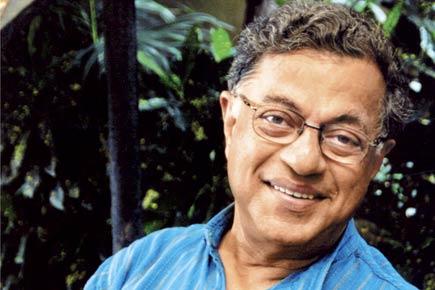Playwright and film personality Girish Karnad, who was in the city recently for a performance of his play Boiled Beans on Toast, talks to Vidya Heble about city life and how it impacts relationships

Q. What is Boiled Beans on Toast about?
A. It is about what is happening to our cities now. It’s not pessimistic, it’s about how fluid life in the cities is. Bangalore for instance had a population of 30,000 in 1970, now it is more than a crore.
So it means most of these people have come from outside. So everyone is a roofless person in the city. When you think about cities such as Pune or Bombay, there are always second- or third-generation people who have grown up there.
ADVERTISEMENT

Girish Karnad. Pic/courtesy Vilas Kalgutker, Harmony Magazine
But this is not true of today’s Bangalore. They are all outsiders. If you take an autorickshaw today you have to tell the driver where to go because that boy has just come to the city a few months ago from Davangere or somewhere like that, because he needs a job.
I feel that our writers have not been able to capture what is happening to Indian cities, mainly because they themselves grew up in small towns. Many of our best writers are from small towns.
Their nostalgia is for that world. So they are unable to grasp and write about it. Another thing they have not been able to deal with is the electronic and technological revolution. It’s a world that someone who has grown up in a village, like myself, does not really comprehend.
Q. Do you think that the changing of the city is in a way parallel to how communication and relationships are changing?
A. Yes, already they are saying that 70 per cent of India will be in cities.
Q. So there is no more that demarcation of rural vs urban?
A. No. But there has always been the impression that rural areas are backward. This is a relic of the British administration which put everything in cities.
Colleges, hospitals, government offices, even for medicines people had to come to the cities. But not any more. This difference broke down thanks to radio and television.
In the last 15-20 years, the mobile revolution has turned it all topsy turvy. The mobile phone has made all sorts of things possible you don’t need to depend on anyone for your music for example, you can just download or record your own. There is for example an entire industry of Bhojpuri music.
Q. Now, in this world of blurred lines, where would an urban dweller go when seeking a rural retreat?
A. Well, the rich still have their retreats, their farmhouses. But the point is that they are still dependent on servants who come from villages. In the old days servants had their own quarters but now a middle class home will have no clue where the servant or the driver lives. There is a whole world out there which the middle class does not realise.
Q. So the class divide is still there...
A. The class divide is very much there, but on the other hand the dependence of the various classes has become more intricate. A man works and a woman works, they make money, and they are more dependent on the servant. If the cook doesn’t come to work, there is chaos. And the cook could sell off half your property and you wouldn’t know.
Q. Do you think the coming together of rural and urban has affected people’s character in any way?
A. Character in this sense: When there was a specific society in a village, everyone knew what everyone was doing. Now people come to the city; their parents don’t know where they live. Their parents don’t know what they are doing. There is a certain independence from each other. But it also means sexual and moral freedom.
So the coherent society we are nostalgic about, where there were parents to fall back on, an uncle to fall back on, is disappearing. And as I said, it is on all levels. One of the characters in my play is a young man who rebels against his always-absent father.
But he has nothing to rebel against except that he is a very gifted veena player. So he joins a band and plays the guitar. He has got too much money to rebel, so he finds his rebellion in music. And when one of the servants in the house is accused of stealing, he actually finds himself attracted to her; that is another kind of rebellion. There is a kind of inversion of values.
Q. As someone who observes society, where do you see this going?
A. I don’t know. In my own generation, I grew up in a village which had no electricity. So from there to now, I have come from the medieval to the ultra-modern. And I would not predict. What is happening itself is so
fascinating.
Q. Do you think we are equipped to deal with change at this pace?
A. Oh, absolutely. I am no doomsayer. I think technology may be creating problems but we are also evolving ways to handle it. There is more education, more information today.
Take even something like rape 10 years ago women would have hidden it, today people can talk about it. Media is exposing much more in society today than ever before. I am not being judgmental; you can argue that there is no privacy left, but there is an aspect which is also constructive.
Boiled Beans on Toast By Girish Karnad Publisher Oxford University Press Price Rs 195
 Subscribe today by clicking the link and stay updated with the latest news!" Click here!
Subscribe today by clicking the link and stay updated with the latest news!" Click here!







